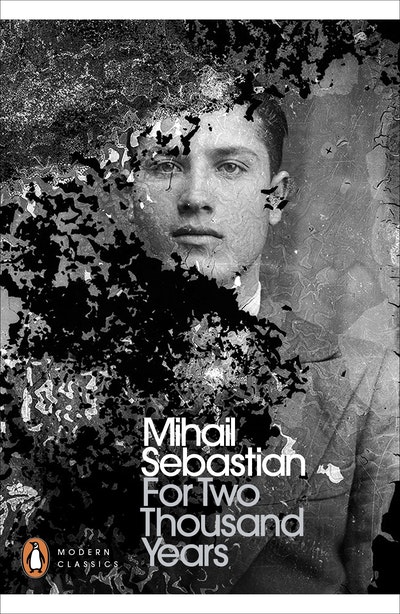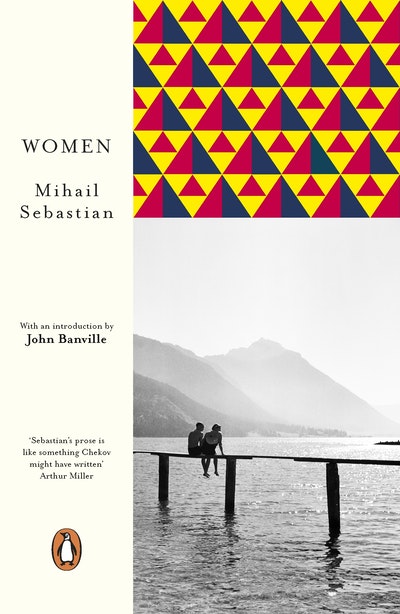- Published: 1 May 2016
- ISBN: 9780241189610
- Imprint: Penguin Classics
- Format: Paperback
- Pages: 240
- RRP: $24.99
For Two Thousand Years
- Published: 1 May 2016
- ISBN: 9780241189610
- Imprint: Penguin Classics
- Format: Paperback
- Pages: 240
- RRP: $24.99
It wonderfully captures the sense of pre-war Romania in all its sophistication, its beauty and its horror... I love Sebastian's courage, his lightness and his wit
John Banville, Open Book, Radio 4
Mordant, meditative, knotty, provocative... More than a fascinating historical document, it is a coherent and persuasive novel... Penguin should be applauded for finally bringing this book to an anglophone audience. Philip Ó Ceallaigh's translation is highly convincing and sweeps us along with its protagonist's emotional shifts
Toby Lichtig, Financial Times
Eerily prophetic... a brilliant translation of a most unusual novel. For Two Thousand Years is a book of truths
Eileen Battersby, Irish Times
One of the most unusual, seductive and beautiful books I've read in years. It has lightness of touch coupled with astonishing range... Like any classic of a type we've not seen before, it is a book which needs to be read and re-read and which, over years, will become a reliable friend for life
John Self, Jewish Quarterly
For Two Thousand Years is lucid, melancholy and playful - a fictional memoir recreating the night-life and love affairs, friendships and betrayals of a world that was falling apart
John Gray, author of The Soul of the Marionette
Philip Ó Ceallaigh's meticulous and vibrant translation restores to us the wry, bitterly intelligent, endlessly self-castigating yet dauntingly perceptive and prophetic voice of Mihail Sebastian. For Two Thousand Years is a masterful book charged with the tension and paranoia that preceded one of the bloodiest convulsions in the history of the 20th century, and the terrifying thing is, it could have been written yesterday, today, tomorrow
Colin Barrett, author of Young Skins
A powerful and prescient novel which throws light on darkness and disturbs as it entrances... If there is any justice [Sebastian's] posthumous profile will increase
Malcolm Forbes, Herald Scotland
Complex, unsettling... Sebastian seldom provoked indifference in his readers. That is why he belongs in the pantheon of classic authors... For Two Thousand Years is a work that also speaks to our own discontents right now
Gavin Jacobson, New Statesman
His prose is like something Chekhov might have written - the same modesty, candour, and subtleness of observation
Arthur Miller
Restraint is the defining mark of both For Two Thousand Years and the subsequent Journal, as it is of Sebastian's personality... In a truly atrocious time he refused to compromise on his duties as a civilized human being... Even on the darkest pages he finds room for a graceful turn of phrase, a flash of wit, a gesture of understanding and forgiveness
John Banville, New York Review of Books
At a dark moment of identity politics and resurgent nationalism, the books that have left the deepest impression have been those that offer a sense of what we might learn from times past. Nothing I have read is more affecting than Mihail Sebastian's magnificent, haunting 1934 novel, For Two Thousand Years (trans Philip Ó Ceallaigh), now available in English
Philippe Sands, Guardian Books of the Year
The best novel of the year was written in 1934. Mihail Sebastian's For Two Thousand Years, an account of interwar Bucharest by a nameless Jewish student, took a human lifespan to find an English translation
Janan Ganesh, Financial Times
An elegant and candid and horrifyingly understated account of watching violent unreason rise around you
Ben Lerner, Paris Review
Remarkably pertinent to our time and place. . . What's chilling about For Two Thousand Years, in this sensitive translation by Philip O Ceallaigh, is how its oppressive atmosphere foreshadows the rise of Romanian authoritarianism and the destruction of Romanian Jewry, even though it was published before the fascists came to power. . . I can't help thinking that Mihail Sebastian is sending us a message across the generations
New York Times Review of Books




